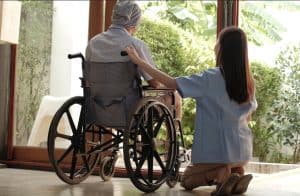
Suspect your elderly parent or grandparent is being abused in their nursing facility? You’re not alone in feeling like getting help is way too complicated. Kentucky’s crime reporting systems have some serious gaps that leave nursing home residents vulnerable and families struggling to find justice.
Document everything you see during visits – bruises, behavior changes, how staff responds. These records matter when official systems drop the ball.
If you’re trying to figure out how to report nursing home abuse, don’t do it alone. The team at Flora Templeton Stuart Accident Injury Lawyers knows how to navigate this system and can help you get justice. Call 888-782-9090 or contact us today.
Your Legal Rights in Kentucky
Kentucky has strong protections for elderly residents in care facilities, but they only work when abuse gets properly reported and investigated.
Since January 2021, the FBI’s National Incident-Based Reporting System (NIBRS) became the standard for tracking crime data nationwide. This affects how nursing home abuse cases get documented. The problem? NIBRS is great at tracking traditional crimes, but nursing home abuse often involves subtle neglect or financial exploitation that doesn’t fit standard categories.
Here’s what Kentucky law requires: Nursing homes must report suspected abuse within 24 hours. If facility staff won’t document your concerns, you can file reports directly with Adult Protective Services and local police.
Time Matters – A Lot
The sooner you act, the stronger your case:
- Within 24 hours: Facilities must report suspected abuse (if they don’t, they’re breaking the rules)
- Within 72 hours: Adult Protective Services usually starts investigating
- 30-60 days: Full investigation timeline (complex cases take longer)
- 1 year: Kentucky’s statute of limitations for personal injury claims starts from when you discover the abuse
Get copies of all incident reports immediately. Facilities sometimes “lose” documentation when lawsuits look likely.
Finding Justice Despite the System’s Gaps
Despite these challenges, Kentucky families have options. The Beshear-Coleman administration has awarded over $133 million in grants to victim service agencies, showing commitment to supporting crime victims even as reporting systems change.
When you work with Flora Templeton Stuart, you get someone who understands both old and new reporting systems and knows how to build a strong case even when documentation is missing. They gather evidence through medical records, financial documents, witness statements, and facility compliance records – creating a full picture that overcomes system limitations.
Don’t wait for criminal charges to pursue civil action. Your case can move forward independently of criminal investigations, often getting you faster results and compensation.
How Funding Cuts Affect Victims
Recent federal funding changes directly impact resources available to nursing home abuse victims. In October, Governor Beshear announced a $2.5 million Department of Justice grant to help with sexual assault cases. While this is primarily for sexual assault, it shows the broader funding challenges affecting all abuse victims, including those in nursing homes.
The VOCA (Victims of Crime Act) grant program supports direct assistance to victims of child abuse, sexual assault, and domestic violence. But nursing home abuse victims often fall through the cracks of these categories. In September, the state awarded nearly $27 million, including $10 million from the American Rescue Plan, to help offset federal funding reductions.
What this means: fewer resources for victim advocates, longer wait times, and more pressure on families to figure things out alone.
Ask your attorney about pro bono victim advocacy services. Many law firms have connections to nonprofits that can help even when government funding decreases.
Why Modern Systems Miss Elder Abuse
The Law Enforcement Agency Reported Crime Analysis Tool (LEARCAT) gives access to NIBRS data from 2016 to 2022 – great visibility into crime patterns. But it still misses the nuanced reality of nursing home abuse.
Physical bruises might get documented, but emotional manipulation, financial coercion, and systematic neglect often leave no digital footprint. Successful cases require evidence beyond official reports – medical records showing patterns of “accidents,” banking statements with unauthorized transactions, staff turnover rates at facilities.
Create a private log of all interactions with facility staff, including dates, times, and names. These notes often prove more valuable than official reports.
Report to Multiple Agencies
When reporting abuse, file with multiple agencies at once – Adult Protective Services, local police, and the state ombudsman. This ensures your case doesn’t fall through jurisdictional cracks.
Common Questions
- How does NIBRS affect nursing home abuse cases? NIBRS requires more detailed documentation, but many abuse cases involve gradual neglect or financial exploitation that doesn’t fit traditional crime categories. You need attorneys who know how to document abuse outside standard frameworks.
- What if the nursing home won’t document my complaint? File reports yourself immediately with Adult Protective Services (1-877-597-2331), local police, and the Long-Term Care Ombudsman. Document their refusal in writing and contact a Kentucky nursing home abuse attorney.
- How have VOCA funding changes affected support services? Reduced federal funding means longer wait times and fewer advocates. Many families now need private legal representation to access services that used to be provided through victim assistance programs.
- Why does abuse go unreported? Nursing home abuse often involves subtle patterns – missed medications, social isolation, gradual financial drain – that don’t trigger traditional crime reports. Facilities may also underreport to protect their reputation.
- What evidence should I gather? Document everything: photograph injuries, save medical bills showing unusual patterns, record staff conversations, maintain visitor logs. Request complete medical records, medication logs, and financial statements.
Work with Someone You Can Trust
When reporting systems fail, families need advocates who understand both the legal landscape and the human cost of elder abuse. Don’t let your loved one become another statistic lost in the system gaps.
Flora Templeton Stuart’s legal team is ready to guide you through the complexities and make sure your voice gets heard. Call 888-782-9090 or contact us today to stand up for their rights.

